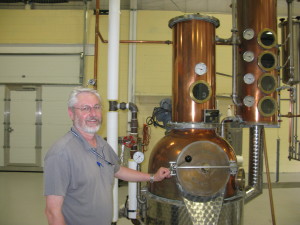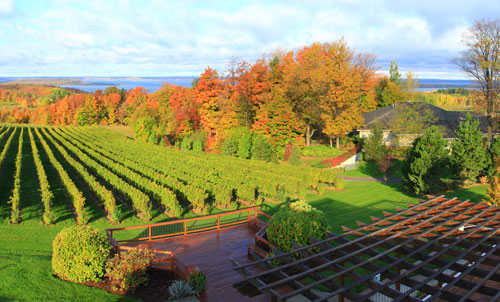Condensing Liquids into Wealth At Michigan State
If Prohibition was still in effect (thank goodness it isn’t), Dr. Kris Berglund might well be public enemy number one.
He’s the man behind the Michigan State University (MSU) artisan distilling program. This unique program is an entrepreneur’s dream come true as craft distilleries are very much the rage.
In addition to the explosion of craft and microbreweries and wineries throughout the Midwest, small distilleries are thriving in the heartland by producing all kinds of wonderful spirits.
Dr. Berglund is one of the pioneers of this spirited movement. Founded over 15 years ago as a facility for food science, chemistry and chemical engineers, the MSU distillery enables students to get hands-on experience in the formulation, production and marketing of distilled spirits.
What, you say, a school where kids learn to make booze? Well, “yes,” in a word!
The distillery, named Red Cedar Spirits, is a completely separate entity and operation from the University. Complying with the strict spirit laws of Michigan is critical. First, all Red Cedar Spirits must be purchased through the State of Michigan.
In addition, the distillery is located off-campus in what was the old Lansing public works building. This unique private-public venture exemplifies what can be accomplished when creative talents combine their resources. The students are actual employees, not interns, adding to the professional nature of the business.
Kris Arvid Berglund, Ph.D., the University Distinguished Professor of Food Science and Chemical Engineering is not only professional, he’s also accessible, erudite, down-to-earth and very funny.
According to Berglund, when he launched the distillation program in 1996 he did not have lofty expectations. “To paraphrase the classic comment, ‘when you’re up to your ears in alligators you need to remember the original goal was to drain the swamp,'” he says with a laugh. And that original goal has always been to promote economic development in Michigan.
“We started with winemaking and evolved from there,” Berglund says. “We wanted to be practical and not just a research project.”
During the mid 1990s, Michigan was beginning to gain national recognition for winemaking. As the wine industry developed, a logical extension of the University’s involvement in that facet of the adult beverage business was to facilitate winemaking and oenological training.
See related story: MSU Propels Michigan Wine Industry
As the operation grew and evolved, spirits production and marketing were added to enhance the goal of economic development. The range of spirits is vast and varied, so there’s plenty of room to grow.
Right now, gin- the original flavored vodka- is on the cusp of being “the next big thing.”
Gin is made in a variety of styles and flavor profiles. It won’t ever be as popular as vodka, but sales are steadily increasing. Kris opines that, “the opportunities for growth are amazing. We’re making delicious vodka and are experimenting with a range of flavored vodkas.”
While vodka has been the planet’s most popular spirit for years, bourbon is the fastest growing spirit now. And yes, they also make bourbon at Red Cedar Spirits.
One blend uses red, white and blue corn-you can’t be more patriotic than this. What’s the brand you ask? It’s pretty simple, just Red Cedar Spirits Bourbon.
As Kris says, “We’re pretty simple around here, we just make it and sell it!” Gin, vodka and whiskey all have “a lot of room to play around in” as far as the blend of ingredients. (Looking for something a bit different? Kris and the team make a vodka from apples!)
Last year Dr. Berglund and his team opened up “the cocktail bar,” also known as the tasting room, to further educate MSU students in the subtleties of selling to the public. This on site tasting room/bar is an opportunity for a seamless fit and for “adding value to the schools’ hospitality business program.”
What a concept: Students majoring in hospitality can patronize an establishment operated by his or her fellow students while enjoying the fruits of their labors!
But let’s not forget wine. As wine consumption continues to increase in the Midwest, Dr. Berglund sees fortified wines becoming more popular. There are various methods for producing fortified wines and you can be sure Kris and his students will be on the forefront of fortified wine production.
While there are currently over 30 licensed distillers in Michigan, they’re still “small potatoes” in comparison to the vast spirits industry. The key is that, way back in 1996, when this program began, there were no distilleries in Michigan. That’s economic progress. Dr. Berglund’s program at Michigan State has led the way for the growth of wineries, breweries and distilleries in the Wolverine state. As the song goes, “there ain’t no stopping us now.” Slainte!
Michael Schafer Esq., The Wine Counselor®, is a wine educator, speaker, Sommelier, C.S.W., writer and consultant who entertains while educating. His approach to wine is reflected in his trademark phrase, ‘I taste bad wine so you don’t have to”®
For more information see: www.winecounselor.net




